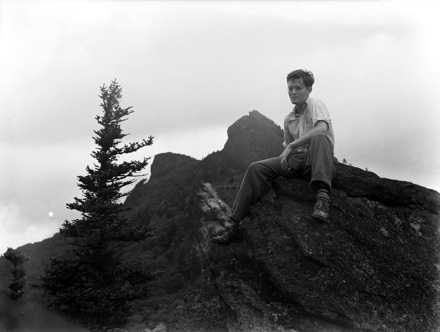“Grandfather is protected for good, over and done, period.”
–Crae Morton
North Carolina is buzzing with this news today, so we would be remiss not to mention here on A View to Hugh the announced sale of Grandfather Mountain to the state of North Carolina. The Asheville Citizen-Times provides additional details on the deal, and Grandfather Mountain has also put out a news release.
It is extremely gratifying to know that as we work here at UNC to preserve and ensure access to Morton’s “mountain” of photographs, the same will be done for his “other” Mountain, in perpetuity. Hugh Morton would be proud.


The WRAL web site used a great Hugh Morton image to supoort this story last week.
http://www.wral.com/news/local/image/3630711/?ref_id=3630856
Also, “Windows” magazine used the Morton photo that is in this post in its Fall, 2007 issue to support the story of the great work you guys are doing. It’s on page 23 of that issue.
http://www.lib.unc.edu/fol/07_fall_windows.pdf
Anne Mitchell & David Whisnant’s Sunday N&O piece provides some additional info/perspective on the history of Grandfather’s “ownership.”
To see the role that The Nature Conservancy played in the protection of Grandfather Mountain, see the OpEd originally printed in the Charlotte Observer on October 2:
Preserving Grandfather’s ecological treasure trove
Public-private partnerships helped secure N.C.’s newest state park
Posted: Thursday, Oct. 02, 2008
From Katherine Skinner, executive director of the N.C. chapter of the Nature Conservancy:
This week’s announcement that the state was purchasing Grandfather Mountain to turn it into a state park was the culmination of a preservation partnership that stretches back almost two decades. Without this partnership involving the Morton family, the Nature Conservancy, the Conservation Fund and state government, Grandfather Mountain State Park would not be a possibility.
The Nature Conservancy first partnered with the Morton family in 1990, buying a 146-acre conservation easement at Grandfather Mountain. Over the years, the Conservancy’s efforts on Grandfather grew to the protection of 1,800 acres through conservation easements and another thousand acres bought outright by the Conservancy.
Naturalists have long recognized Grandfather’s special beauty. When John Muir visited the site in the 1890s he said the mountain was “the face of all heaven come to earth.” A century after Muir’s visit, the United Nations recognized Grandfather Mountain as an International Biosphere Reserve. The N.C. Natural Heritage Program has done important work at the site, documenting its ecological significance. Thanks to that work, Grandfather Mountain has been a Registered Natural Heritage Area since 1979.
Grandfather Mountain is a site of global ecological significance, providing habitat for more rare species than any other mountain east of the Rockies. Its steep slopes, rock crevices and moist woodlands harbor 73 rare or endangered species, 29 of which are considered to be globally imperiled because of their rarity. Examples are the diminutive Carolina northern flying squirrel and the even smaller spruce fir moss spider. Rare flowering plants include the Blue Ridge goldenrod and spreading avens. Sixteen different natural communities can be found at Grandfather, a natural heritage treasure that has virtually no parallel. A person hiking the 2.7 mile Profile Trail walks through seven natural communities, experiencing everything from rhododendrons blooming in rich woodlands to rare herbs thriving in mountain wetlands.
Grandfather Mountain State Park is a wonderful legacy for Hugh Morton. Thanks to this decision by his heirs, Mr. Morton’s commitment to preserving this very special place will live on.
It is also a legacy for the other partners who worked over the years to preserve this North Carolina natural landmark. Such a great conservation milestone could never be reached without many folks working together for the greater good. In addition to the Nature Conservancy, the other partners include: the Clean Water Management Trust Fund, which spent more than $4 million to preserve vital parts of the mountain; the Natural Heritage Program, which has documented its ecological significance, and the Conservation Fund, which helped to broker the state parks deal. The parks purchase will be covered by two other state funding entities – the Natural Heritage Trust Fund and the Parks and Recreation Trust Fund – using a funding opportunity provided by the General Assembly this past session. That funding was strongly supported by Land For Tomorrow, a statewide partnership of concerned citizens, businesses, interest groups and local governments. .
The citizens of North Carolina are getting an incredible value at minimal expense. Much of that is due to the conservation work done over the past two decades in purchasing conservation easements that precluded development on much of the property. The state’s acquisition ensures that the public will have perpetual access to this incredible place.
On behalf of all the preservation partners who have worked tirelessly for Grandfather’s preservation, I am so happy to see this ecological treasure trove preserved for the ages.
This article was on “StarNewsOnline” last Thursday, March 26th:
http://www.starnewsonline.com/article/20090326/APN/903262739&tc=email_newsletter
The Morton family has been honored for their conservation work by the National Association of State Park Directors, as reported by the Citizen-Times.